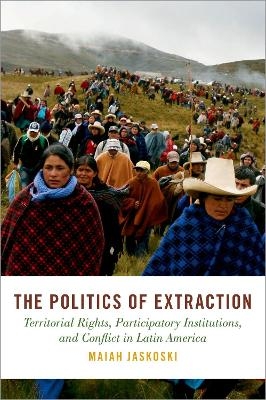
The Politics of Extraction
Oxford University Press Inc (Verlag)
978-0-19-756892-7 (ISBN)
In The Politics of Extraction, Maiah Jaskoski looks at how mobilized communities in Latin America's hydrocarbon and mining regions use participatory institutions to challenge extraction. In some cases, communities act within formal participatory spaces, while in others, they organize "around" or "in reaction to" these institutions, using participatory procedures as focal points in the escalation of conflict. Based on analysis of thirty major extractive conflicts in Bolivia, Colombia, and Peru in the 2000s and 2010s, Jaskoski examines community uses of public hearings built into environmental licensing, state-led prior consultation with native communities affected by large-scale development, and local popular consultations or referenda. She finds that communities select their strategies in response to the specific participatory challenges they confront: the trials of initiating participatory processes, gaining inclusion in participatory events, and, for communities with such access, expressing views about extraction at the participatory stage. Surprisingly, the communities least likely to channel their concerns through state institutions are the most unified and have the strongest guarantee of participation. Including a wealth of data and complex stories, Jaskoski provides the first systematic study of how participatory institutions either channel or exacerbate conflict over extraction.
Maiah Jaskoski is Associate Professor of Political Science at Northern Arizona University. She specializes in environmental and indigenous politics, military roles, security privatization, and borders, in Latin America. She is the author of Military Politics and Democracy in the Andes and numerous academic journal articles. She also co-authored and co-edited American Crossings: Border Politics in the Western Hemisphere.
Acknowledgements
List of Acronyms and Abbreviations
Part I. Introduction
1. PARTICIPATORY INSTITUTIONS AND EXTRACTIVE CONFLICT
Part II. National Political Dynamics
2. EXTRACTION AND CONFLICT IN BOLIVIA, COLOMBIA, AND PERU
3. PARTICIPATORY INSTITUTIONS AND THEIR UNDERLYING BOUNDARIES
Part III. The Conflicts
4. THE EVENT INITIATION CHALLENGE AND CONTESTED POLICY JURISDICTIONS
5. THE INCLUSION CHALLENGE AND CONTESTED GEOGRAPHIC BOUNDARIES
6. THE ARTICULATION CHALLENGE AND CONTESTED COMMUNITY REPRESENTATION
Part IV. Conclusions
7. BOUNDARY STRUGGLES IN LATIN AMERICA'S EXTRACTIVE ZONES
Appendix A. Omission of the Tintaya/Antapaccay Conflict
Appendix B. Study Participants
References
| Erscheinungsdatum | 06.07.2022 |
|---|---|
| Reihe/Serie | STUDIES COMPAR ENERGY ENVIRON POL SERIES |
| Verlagsort | New York |
| Sprache | englisch |
| Maße | 161 x 238 mm |
| Gewicht | 590 g |
| Themenwelt | Naturwissenschaften ► Biologie ► Ökologie / Naturschutz |
| Sozialwissenschaften ► Politik / Verwaltung ► Europäische / Internationale Politik | |
| Sozialwissenschaften ► Soziologie ► Spezielle Soziologien | |
| ISBN-10 | 0-19-756892-0 / 0197568920 |
| ISBN-13 | 978-0-19-756892-7 / 9780197568927 |
| Zustand | Neuware |
| Haben Sie eine Frage zum Produkt? |
aus dem Bereich


